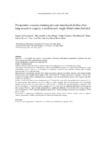Preoperative exercise training prevents functional decline after lung resection surgery: a randomized, single-blind controlled trial

Ver/
Use este enlace para citar
http://hdl.handle.net/2183/19338Coleccións
- Investigación (FFISIO) [481]
Metadatos
Mostrar o rexistro completo do ítemTítulo
Preoperative exercise training prevents functional decline after lung resection surgery: a randomized, single-blind controlled trialAutor(es)
Data
2016-12-20Cita bibliográfica
Sebio García R, Yáñez-Brage MI, Giménez Moolhuyzen E, Salorio Riobo M, Lista Paz A, Borro Mate JM. Preoperative exercise training prevents functional decline after lung resection surgery: a randomized, single-blind controlled trial. Clin Rehab. 2017;31(8):1057-1067
Resumo
[Abstract] Objectives: To investigate the effects of a preoperative pulmonary rehabilitation programme in patients with lung cancer undergoing video-assisted thoracic surgery.
Design: Randomized, single-blind controlled trial.
Setting: Teaching hospital.
Subjects: Patients with suspected or confirmed lung cancer undergoing video-assisted thoracic surgery.
Intervention: Participants were randomized to either a prehabilitation group or a control group. Participants in the prehabilitation group underwent a combination of moderate endurance and resistance training plus breathing exercises three to five times per week.
Main measures: The primary outcome of the study was exercise capacity. Secondary outcomes were muscle strength (Senior Fitness Test), health-related quality of life (Short-Form 36) and the postoperative outcomes. Patients were evaluated at baseline (before randomization), presurgery (only the prehabilitation group), after surgery and three months post-operatively.
Results: A total of 40 patients were randomized and 22 finished the study (10 in the prehabilitation group and 12 in the control group). Three patients were lost to follow-up at three months. After the training, there was a statistically significant improvement in exercise tolerance (+397 seconds, p = 0.0001), the physical summary component of the SF-36 (+4.4 points, p = 0.008) and muscle strength (p < 0.01). There were no significant differences between groups after surgery. However, three months postoperatively, significant differences were found in the mean change of exercise capacity (p = 0.005), physical summary component (p = 0.001) and upper and lower body strength (p = 0.045 and p = 0.002).
Conclusions: A pulmonary rehabilitation programme before video-assisted thoracic surgery seems to improve patients’ preoperative condition and may prevent functional decline after surgery
Palabras chave
Cancer
Exercise programme
Preoperative care
Pulmonary rehabilitation
Quality of life
Exercise programme
Preoperative care
Pulmonary rehabilitation
Quality of life
Versión do editor
ISSN
0269-2155
1477-0873
1477-0873





